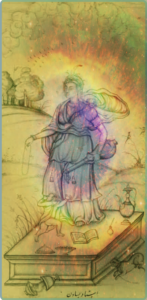Healing Mudras – Suravi mudra
Quite remarkable is this little hand-gesture called the Suravi Mudra.
It is made by connecting the fingers in a little web.
The index finger of the right hand touches the middle finger of the left.
The third finger of the right hand touches the fourth finger of the left.
The second finger of the right, the index of the left.
The fourth finger of the right, the third finger left.
As you would notice, the fingertips cross-over. The thumbs are held free.
The first finger of the either hand to the second finger of the other, the third finger of either hand with the fourth finger of the other, you get the drift by now.
The benefits of this Mudra is wish-fulfilment. Naturally the mind helps if you’re seeking such a privilege spiritually. Calm yourself when sitting and practicing, let the breaths be slow and deep, always remembering to breathe out the nose not the mouth. Thats the key to deep breaths after all.
If you can, observe the gaps between the breaths, with the hands held in this gesture. If you need to, internally practice or chant a calming mantra.
If it helps, see a subtle sliver of light in the third eye, very gently raising the eyebrows to focus it.
Remain in this mudra for a few minutes. 4-5 minutes is sufficient, longer is good too. Thereafter meditate a little, or transfer your fingers to a different mudra slowly building and integrating it into a periodic process.
Since we’re talking about Suravi mudra, I’ll share little stories about the star Suravi, and the origin of the name of this mudra.
Suravi Mudra and the Nakshatra Rohini
In the constellation Taurus, at the eye of the bull is the star Alderberan. The Indians know it as the Nakshatra Rohini, regarded as the moon’s favourite. The star in question within the asterism is called Rohit, which was also the heavenly deer. In the past, owing to this star’s colour, it has also been called Haladdi-varna (Alberberan). The colour this star usually shines with is a dull red, otherwise called its ruddy nature.
In ancient astronomy, this star is referred to as Suravi, the Divine cow, and the mother of all cows, just as Sarama, of Canis Minor, is the mother of all the canines as a heavenly hound.
The Hari-Vamsa attributes a line to Suravi in its praise
Rohini Surabhi devi, Aditih devaki hī amoot.
– Hari Vamsa
‘The mother of cows Suravi appeared as Rohini, whereas Aditi, the divine mother then bore to form Devaki’s adorn.‘

Other benefits of Surbhi Mudra
This mudra as an experience blends into transformation of your inner self! As an ancient hand gesture, this has the ability to influence your Navel Chakra, providing a much-needed relief from digestive issues. By balancing the excess levels of energy in your body, Surabhi Mudra helps to restore vitality and maintain equilibrium.
This Mudra also impacts your third eye, enhancing memory and concentration. Practice it regularly and witness a surge in creativity and positivity in your life. And if that’s not enticing enough, Surabhi Mudra can even help to fulfill your deepest desires.
What’s more, this powerful Mudra also has a profound effect on your excretory system, working wonders on gas and acidity.
With Surabhi Mudra, you’ll experience a complete sense of relaxation, paving the way for a fit and healthy mind. As you bask in its meditative aura, your entire being will be rejuvenated and transformed for the better.
Best practiced with Yoga asanas as Siddhasana and Padmasana, meditational seated positions. And on a not too full stomach. A few minutes should suffice.
A coat of quotes and passing poetry
"Artwork of Minerva from Indian Mughal emperor Akbar's court, 1590 
"Those very groups of gods enter into You ; struck with fear, some extol (You) with joined palms.
Groups of great sages and perfected beings praise You with elaborate hymns, saying 'May it be!’
O you, who in some pretty boat,
Eager to listen, have been following Behind my ship, that singing sails along
Turn back to look again upon your own shores;
Tempt not the deep, lest unawares,
In losing me, you yourselves might be lost.
The sea I sail has never yet been passed;
Minerva breathes, and pilots me Apollo, And Muses nine point out to me the Bears.
You other few who have neck uplifted Betimes to the bread of angels upon Which one lives and does not grow sated,
Well may you launch your vessel Upon the deep sea."
"Minerva | Dante Alighieri
